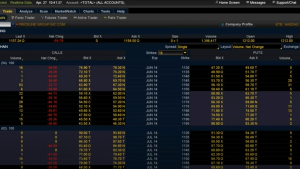 Options trading can be likened to an insurance policy in the stock market where the risks of loss are lessened. However, with options trading, there are several other considerations as compared to the other forms of stock trading such as market risk and the presence of a margin.
Options trading can be likened to an insurance policy in the stock market where the risks of loss are lessened. However, with options trading, there are several other considerations as compared to the other forms of stock trading such as market risk and the presence of a margin.
Options are similar to shares in that they are sold and purchased as an option by a buyer. In options, a buyer holds the right to purchase an underlying commodity or asset at a defined strike price or date before or on a certain date, usually at a set premium; however, not always, depending upon the particular type of option. The buyer has an exclusive right of purchasing or selling the underlying commodity or asset in the event of a “strike”, a period of time determined by the buyer.
The option buyer can also sell his option for the same underlying commodity at the end of the option term if the strike price is not met and it becomes exercisable again. As a trader who is interested in options trading, you should know the technical aspects of this type of investment. This will help you understand whether it is suitable for your requirements.
From “Trading Review” we can see that there are two types of options – call and put. A put is basically a right to sell at a predetermined price; while a call is an agreement to buy an underlying commodity or asset at a pre-determined price at the end of the option term. Call and put options differ in the conditions that govern their sale and purchase. For instance, in a put, a buyer has an exclusive right to buy or sell the underlying commodity or asset, but in a call, only the seller of that option has the right to purchase or sell the underlying commodity or asset.
When you are trading options, it is important to understand the technical aspects of this kind of investment because this will enable you to understand the potential risks and opportunities associated with an investment in options. For instance, some options are known as open-outcry options and these allow traders to sell or buy their option within a certain period of time. However, an “outcry” option is not as liquid as other options and hence it does not permit the trader to sell or buy their option without first securing a sufficient position of the underlying assets.
Options trading is done by placing a bid or offer for an underlying security or asset, called a call, and then waiting for the market makers to execute your order. If you have a favorable result, your share will be sold or purchased at a pre-determined price.
Options trading differs from other kinds of investment, because it involves the seller having an exclusive right of buying or selling an underlying commodity or asset in the event of a strike. The risk of loss, which is associated with these stocks and bonds, lies in the market makers’ inability to successfully execute the order or the trader’s ability to execute the transaction. Although option trading is a low risk, this does not mean that it is free from the risks associated with other investments.
Options trading involves the possibility of your option becoming exercisable for a price that is lower than the strike price. If this occurs, you will be the benefactor of a profit or loss; the price you receive may be lower than the price agreed to but it may also be higher.
Options trading also involves the right of a seller to change their option terms and conditions at any time. If your seller decides to exercise their rights in the future to increase the amount of the strike price, they could raise the price of your option. Your ability to stop them from exercising the rights they have vested in the contract also has to be exercised.
The risk of options trading comes from two different angles, that of the buyer and the seller, the risk of loss and the risk of price. If you are purchasing an option that has a greater than fifty percent chance of becoming exercisable, you may have to face a loss of funds. if you cannot cover that risk by selling your option, if you do not pay for it when it expires.
Option trading is risky and needs to be understood carefully. You have to know what you are getting into before you begin trading options, and why you are investing in options.